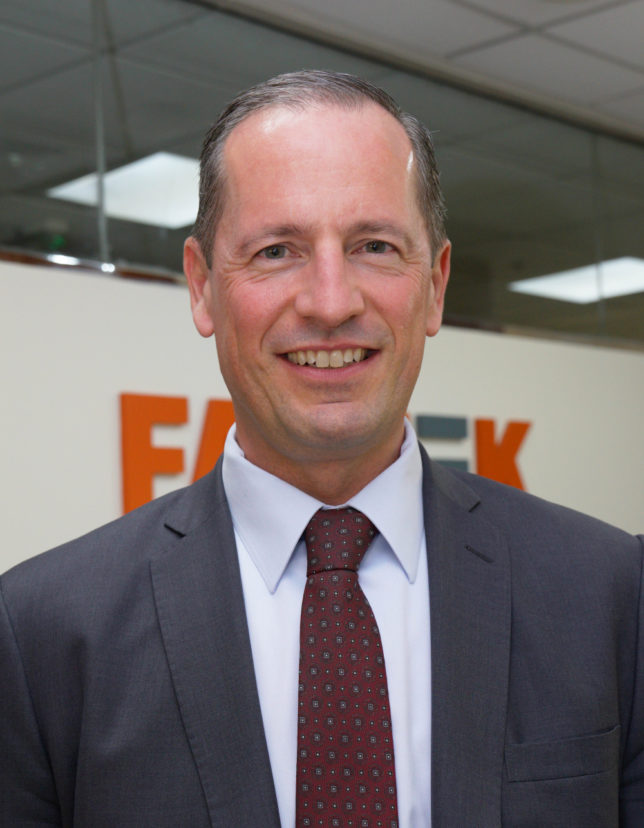No FM professional in the UAE will need to be told just how demanding the past 18 months have been for the industry.
However, with economic recovery gathering pace (the UAE Central Bank is forecasting growth of 4.2% for this year) and technology and sustainability driving both government and corporate strategy, what will the FM industry landscape look like in 2022?
Markus Oberlin, CEO of UAE-based Farnek, which was placed at number four in FM Middle East’s 2021 FM Power 50, shares his top three industry trends to watch out for in 2022.
- Sustainability
Unless you’ve been living under a rock, the environment is now one of the most important issues facing us as individual consumers and commercial organisations. Following the UAE’s recent announcement that it aims to be carbon neutral by 2050, both the public sector and private sector companies will have to participate, it will need to be a collective effort!
To achieve that goal companies will need to put a strategy in place now, to initially reduce carbon emissions and then to offset the remaining emissions. Initiatives such as energy and waste management, developing a sustainable supply chain, smart fleet management to cut down fuel consumption and introducing electric vehicles, will all trend significantly in 2022.
In addition, there will be an associated trend in the hotel and hospitality sector, with increasing numbers of travellers preferring to stay in eco-friendly properties. Many hotels & resorts around the globe have embarked on campaigns that aim to reduce their impact on the environment. Some were independently audited, others chose self-declaration. However, then came the game-changer.
After exponential growth for the search term ‘green hotel’ Google decided to highlight hotels with independent certification with a green logo saying ‘Eco-certified’. Hotels without third party accreditation were not. You don’t need to be a rocket scientist to work out what is going to happen in 2022.
2. Employee welfare
Happy, motivated and dedicated employees, make our customers happy. And it’s not just because it’s a win-win situation, it’s the right thing to do. In a labour-intensive industry such as FM, (Farnek currently has over 8,000 employees), it is vital that management recognise the importance of staff welfare if we as an industry want to continue attracting the brightest talent.
Quality staff accommodation is essential, like Farnek Village our state-of-the-art employee centre. High speed connectivity should be standard, as well as a variety of recreational facilities, good healthcare amenities and comfortable and reliable transportation.
Personal development is also exceptionally important – online educational and training support with tangible career prospects.
But most of all we should respect and celebrate cultural diversity throughout the workforce, with equal opportunities for all. This will drive human resources strategy in 2022.
3. Technology-driven FM that adds all-round value
IoT, AI, Big Data, smart devices and a connected workforce are all terms we have become familiar with and as they continue to evolve, they are transforming the way in which facilities are managed.
Putting that into context, according to research firm Statistica, by 2025 more than 74 billion IoT devices are expected to be installed globally, clearly indicating that this trend will accelerate throughout 2022 and beyond.
To manage this more effectively, assets will be connected to a remote centralised command room where qualified engineers can consolidate, process and analyse all data submitted in real time. Then through a connected workforce, manpower, tools and spare parts can be allocated and dispatched.
Once enough data has been collected a planned preventative maintenance schedule can be put in place. That can extend the lifespan of assets, reduce the risk of disruption and support a more cost-effective and organised workforce, as opposed to relying on the traditional method of scheduling based on running hours or alternatively using a time-based schedule, or indeed simply reacting to asset failure.
Other technological trends next year will include those which add value to the business partnership. Sensors used in facilities can gather a significant amount of data, which can be used to calculate customer footfall, average room temperatures, energy output and water consumption. In addition, biometric devices can check employee time attendance, as well as their welfare – heart rate, blood pressure and body temperature.
Creating added value to gain a competitive advantage will be another major trend in 2022.

